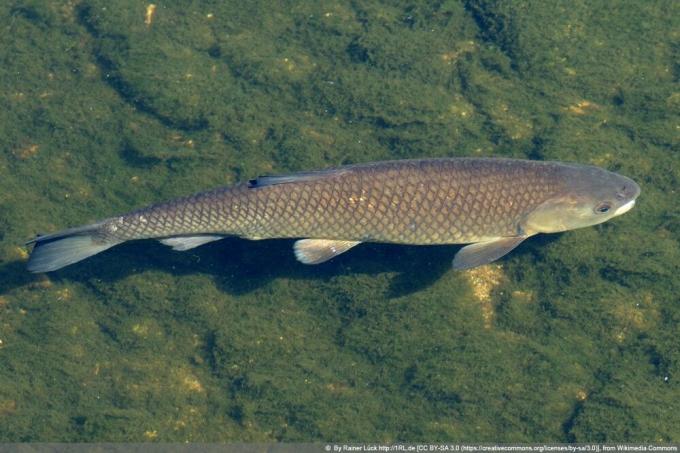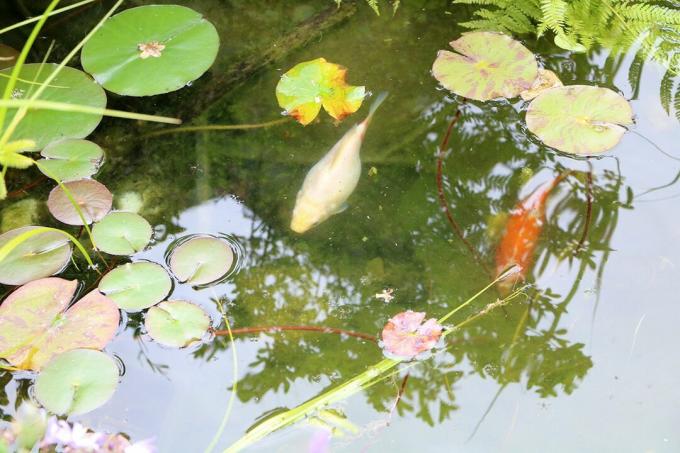

Table of contents
- Suitable garden pond fish
- Goldfish (Carassius auratus)
- Bitterling (Rhodeus amarus)
- Minnow (Phoxinus phoxinus)
- Orfe (Leuciscus idus)
- Koi (Cyprinus carpio)
- Fish not well suited for ponds
- Grass carp (Ctenopharyngodon idella)
- Perch (Perca fluviatilis)
- Sturgeon (Acipenseridae)
- Three-spined stickleback
Fish like the goldfish, the bitterling and the expensive and famous koi are typical fish in the garden pond. But they have different space requirements and demands on the environment. It is important that the pond is large enough. The bigger the better, because that's the only way the fish really feel comfortable.
Suitable garden pond fish
Different fish also have different demands on their habitat. These (sometimes undemanding) fish cope well with the events in the garden pond.
Goldfish (Carassius auratus)

The goldfish is probably the most popular fish ever. It can be found in almost every garden pond. With good reason, because the goldfish is quite undemanding and therefore easy to keep. He likes to live in a group of approx. 4-7 fish and is an omnivore. During the day it is mostly in the deeper layers of the water, but in the evening it likes to be on the water surface. It can feed itself in a balanced ecosystem, but will also eat dry food. When feeding, the goldfish, which often only get their colorful splendor after a few years, like to come to the surface and snatch the food and disappear again.
The goldfish is the ideal fish in the garden pond. It is particularly recommended for full-time employees, while some other types are quite demanding.
Bitterling (Rhodeus amarus)
The bitterling is also an ideal pond dweller. It is quite undemanding and lives as a non-predatory fish in small schools. He eats both dry food and plant food from the garden pond. It grows up to 10 cm in size and falls off mainly due to its special spawning behavior. Bitterlings lay their eggs in shells. Therefore, if you are planning a breeding, it is advisable to use some mussels on the substrate.
Minnow (Phoxinus phoxinus)
The minnow is also a well-suited coarse fish for the garden pond. However, he prefers running water. constantly moving water. In groups of approx. He feels most comfortable with 5-10 fish and shows this by the fact that he can even breed well in the garden pond. He is also quite undemanding and feeds mostly on dry food or small insects.
These three species are best suited for the garden pond, as they do not make great demands on their environment and also do not grow too large. However, individual advice from a specialist retailer or garden center would be advisable, because every pond is designed differently and thus offers other fish species a suitable habitat.
Orfe (Leuciscus idus)

The golden orfe belongs to the carp family. She likes shallow waters and prefers acidic lakes and running waters. It is nice that the golden orfe can be seen a lot on the water surface. She is a surface fish. Due to its intense color, it is very noticeable there. It is a peaceful schooling fish. The golden orfe suffers from poor water quality. The substrate should consist of fine gravel. The fish needs medium water values. Regular partial water changes are recommended. The golden orfe is an omnivore. From flake food to soft plant parts to live food, everything is consumed. Larger orfs sometimes even eat smaller fish.
Koi (Cyprinus carpio)
The Koi is also a carp fish. It is a special breed of carp that was bred in Japan. Kois are very affectionate animals that can also become very trusting. They literally eat out of their owner's hand. They are group animals, they only feel comfortable in the community.
Koi like to dig around, which is why a fine sandy substrate is ideal. Koi love to eat plants, which is why many koi tanks do not have them. If plants are desired in the pond, they must be very resilient and tough. It is important to have good water quality and therefore good water filtration. The pond water must also be changed regularly. Important for the very large animals that they have enough space.
Tip:
Koi are quite susceptible to disease and parasites, especially when their living conditions are less than ideal. They need special food, live food, flake food and also eat lettuce.
Fish not well suited for ponds
There are fish that need much more space and freedom of movement than a garden pond could offer them. Others prefer flowing waters and have no place in a garden pond.
Grass carp (Ctenopharyngodon idella)

Although the grass carp is the ultimate algae eater, the sellers of the animals always forget to add that they only eat algae when nothing else is available. First, the grass carp eat all the pond plants. If you don't want plants, then the grass carp is ideal. Grass carp can grow up to 1 meter in the pond. They are even hardy, but there is a problem with reproduction. It's too cold for them here in Europe.
Perch (Perca fluviatilis)
The perch is a predatory fish. The animals grow large (up to 40 cm) and eat fish, newts, frogs and everything that lives. Their food is often half the size of the perch itself. They are aggressive and pure eating machines. They plunder every pond. The reproduction of the other pond inhabitants no longer has any chjance. The more food the robbers get, the faster they grow and the bigger they get.
Sturgeon (Acipenseridae)
There are numerous species of sturgeon, but almost all of them grow too large for a garden pond. They can grow between 2 and 4 meters tall. Only one species, the sterlet, is suitable for ponds if they are large enough. The Sternhausen is still suitable for very large and, above all, deep ponds. They are only 1.50 meters long. Clean, oxygen-rich water is important.
Three-spined stickleback
Sticklebacks are only suitable for the garden pond to a limited extent because they reproduce in large numbers. The males become very aggressive, even towards larger fish. They relentlessly defend their nest and territory. Sticklebacks are predators. They eat tadpoles, insect larvae, fry, water fleas and other small animals. In large populations they eat all small animals. Sticklebacks are considered bitchy, aggressive and extremely predatory.
 garden editorial
garden editorial I write about everything that interests me in my garden.
Find out more about animals in the garden pond

22 small pond fish | Fish for small pond
Only a small pond fits in small gardens. But Mother Nature has also created a few little fish for these mini ponds. To be more precise, even several interesting species, which are not inferior in beauty to the large specimens. But be amazed!

7 Fish Diseases | Help for pond fish
For many an animal lover, their fish mean everything. The concern is correspondingly great when the animals suddenly behave in a strange way or show external symptoms of one of the numerous pond fish diseases. This guide explains how the owner makes an exact diagnosis, what causes it and what to do in this case.

Overwintering pond mussels | 14 tips for pond mussels in winter
Pond mussels are practical animals for the garden pond, as they can filter and thus clean the water. Their main food source is algae. But what happens to the pond mussel in winter when the water surface freezes over? Here we reveal how overwintering is possible.

Orfe in the garden pond | 10 tips for keeping & propagation
The water has been filled in, the green planting is in place. Now a color contrast and movement in the garden pond are still missing. A swarm of gold orfs can provide both. Yellow-orange in colour, they are clearly circling in the water. When do you feel comfortable in it?

Frog in the pond: what do frogs eat in the garden pond?
Frogs in the pond are important beneficial insects because they devour numerous annoying pests. Frogs are good and patient hunters, able to ambush prey for a long time. The more diverse the pond is designed, the greater the food supply, which attracts different species.

Sturgeon in the garden pond | 10 tips for keeping in the pond
Would you like to enrich your pond with a real sturgeon? The desire for such a striking animal is easy to understand. Our tips on how to handle this living fossil will help you ensure that keeping is always successful.



